Self-Reflection Questions to ask yourself for Personal Growth
What does Self-Reflection mean for women ?
Self-reflection for women is about taking time to think about their thoughts, feelings, and actions.
It helps them understand what’s important to them and what makes them happy.
By reflecting, women can learn about their strengths, areas to improve, and what they truly want in life.
This process also helps women see how their experiences and relationships shape who they are.
It guides them to make better choices and live a life that feels more true to themselves.
In a busy world, self-reflection gives women a moment to pause, think, and grow.
As the saying goes, “Knowing yourself is the beginning of all wisdom.” – Aristotle.
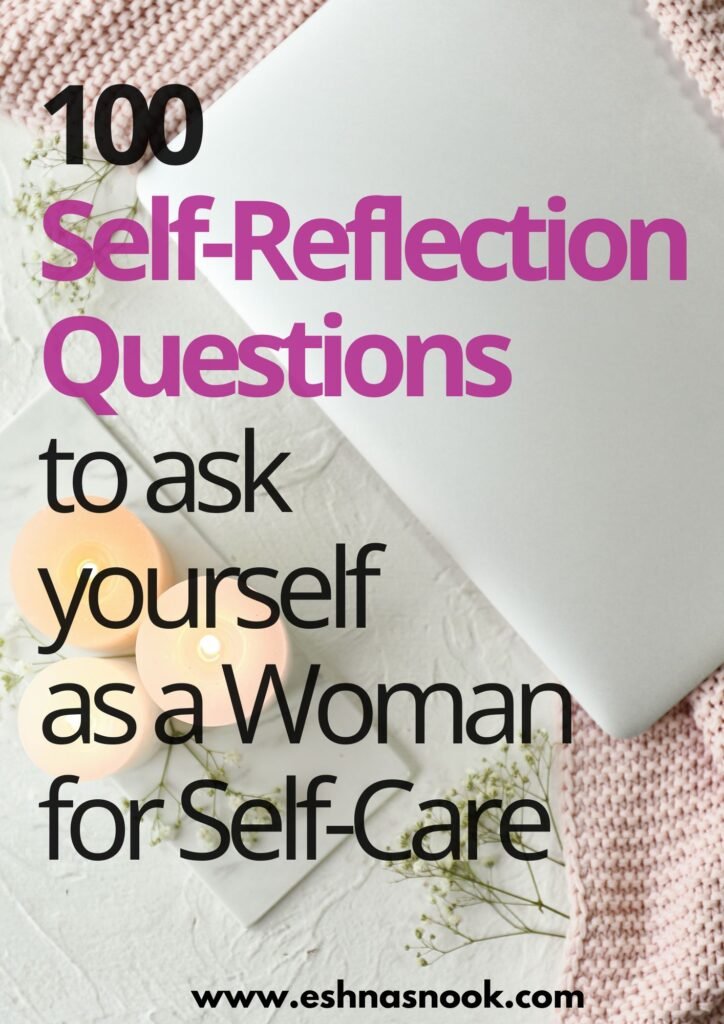
Why Self-Reflection is Important?
Self-reflection is like holding up a mirror to your inner world.
It gives you a chance to pause and think about who you are, what you feel, and how you’re doing in life.
It’s something we all need for personal growth because it helps us learn from our experiences, understand our emotions, and make better decisions.
Self-reflection is when you take time to think about your thoughts and feelings, also called introspection.
By reflecting, you can figure out what’s going well in your life and what might need to change, helping you make better choices.
Asking yourself self-awareness questions can guide your personal growth.
Whether you’re dealing with a tough situation or just want to know yourself better, reflecting on your thoughts and actions can help you grow as a person
“Time spent in self-reflection is never wasted – it is an intimate date with yourself.” – Paul TP Wong
How Questions Help You Understand Yourself
Asking yourself self-reflection questions helps you dig deeper into your thoughts and actions.
It’s like having a conversation with yourself using questions about myself to understand why you do things a certain way.
Also Read
–50 Life Mottos to Keep You Motivated Every Day
–60- Short self-care quotes and tiny reminders to practice self-love daily
These introspective questions can show you what makes you happy and what you really want in life.
Asking deep questions to ask yourself can help you make sense of your life.
“Your vision will become clear only when you can look into your own heart.” – Carl Jung
If you like my post then please

Why Self-Reflection is Important for Women
Dealing with Pressure and Expectations
Women often face many expectations from society—how we should look, act, or live our lives.
These pressures can make it hard to focus on what we really want.
Self-reflection questions can help us step back and think about what’s best for us instead of what others expect.
Asking questions for myself lets us understand our own values and beliefs.
By asking questions to ask myself, you can get clearer on your own values and push back against outside pressures.
Understanding Your Values and Goals
Self-reflection helps women figure out their beliefs, values, and goals.
Asking reflective questions allows you to think about what’s really important to you.
Instead of following what others expect, answering life’s questions helps you choose your own direction and focus on what truly matters.
Here’s a list of 100 Self Reflection Questions to ask yourself for personal development across various aspects of life:
100 Self Reflection Questions
Self Reflection Questions for Self-Awareness and Reflection
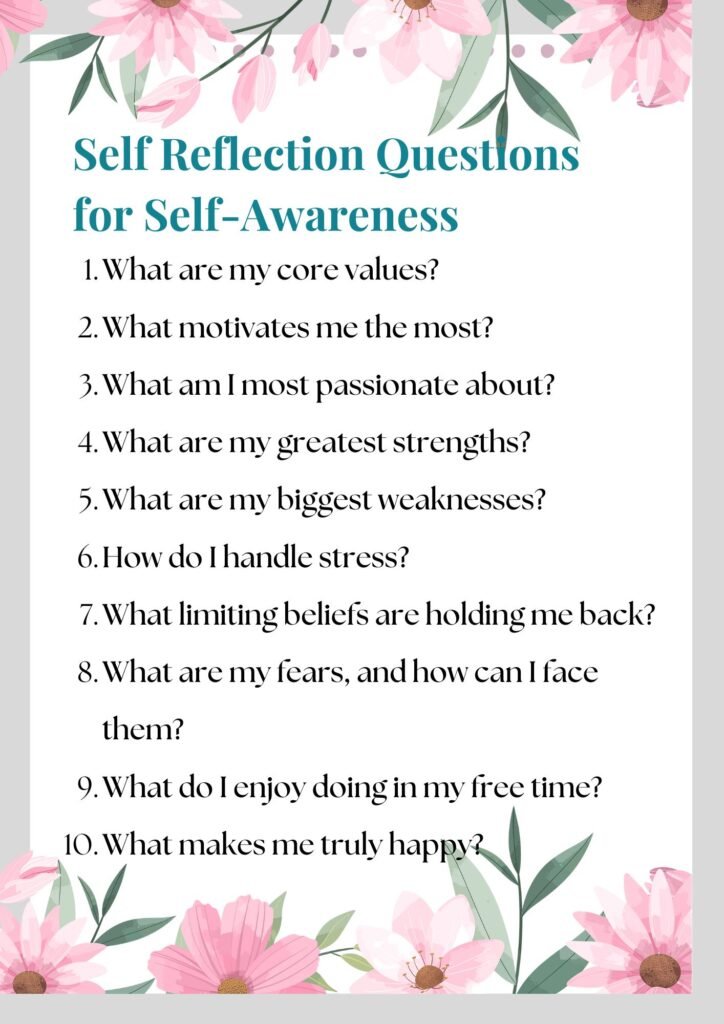
- What are my core values?
- What motivates me the most?
- What am I most passionate about?
- What are my greatest strengths?
- What are my biggest weaknesses?
- How do I handle stress?
- What limiting beliefs are holding me back?
- What are my fears, and how can I face them?
- What do I enjoy doing in my free time?
- What makes me truly happy?
- How do I define success?
- How do I define failure?
- What does my ideal life look like?
- Am I living authentically?
- Do I feel fulfilled in my life right now?
- How do I show love and compassion to others?
- How do I talk to myself when I make mistakes?
- What am I most proud of in my life?
- What habits are preventing me from growing?
- What are my biggest regrets, and how can I learn from them?
Self Reflection Questions for Goals and Aspirations
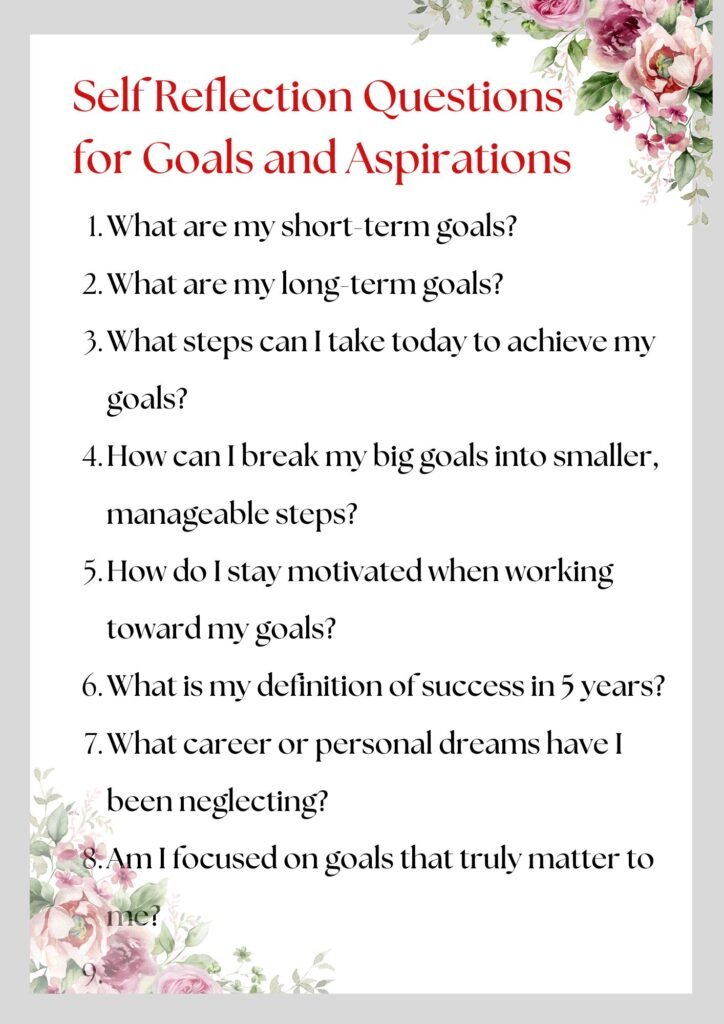
- What are my short-term goals?
- What are my long-term goals?
- What steps can I take today to achieve my goals?
- How can I break my big goals into smaller, manageable steps?
- How do I stay motivated when working toward my goals?
- What is my definition of success in 5 years?
- What career or personal dreams have I been neglecting?
- Am I focused on goals that truly matter to me?
- How do I deal with setbacks in pursuing my goals?
- What can I improve in my daily routine to get closer to my goals?
Self Reflection Questions for Health and Well-being
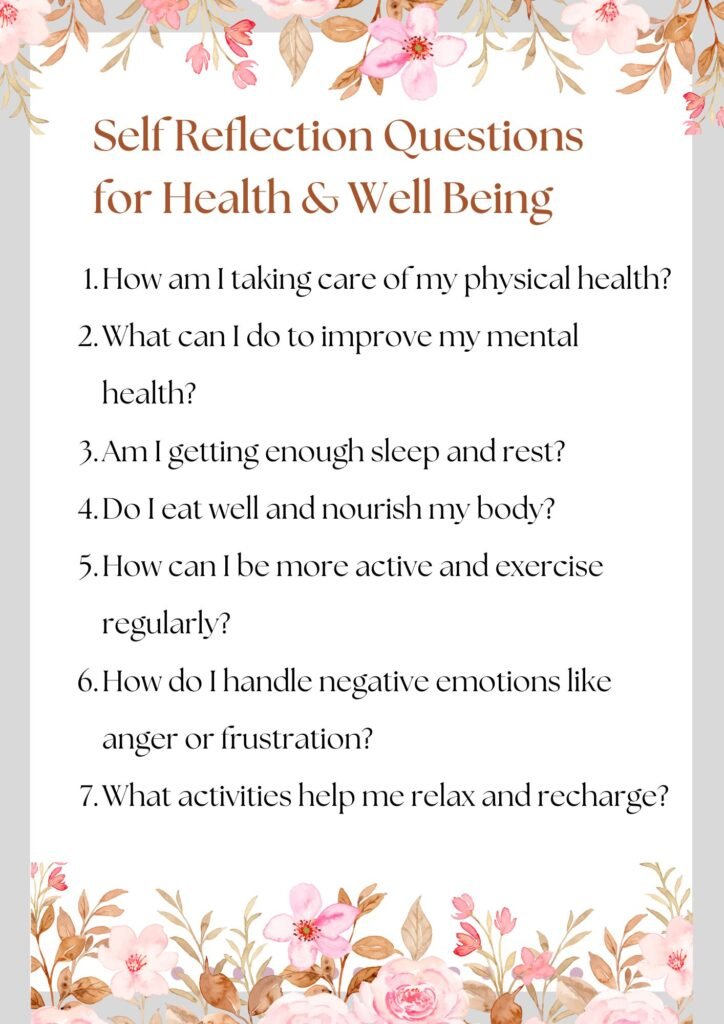
- How am I taking care of my physical health?
- What can I do to improve my mental health?
- Am I getting enough sleep and rest?
- Do I eat well and nourish my body?
- How can I be more active and exercise regularly?
- How do I handle negative emotions like anger or frustration?
- What activities help me relax and recharge?
- How do I balance work and personal life to maintain my well-being?
- How do I practice gratitude in my life?
- Am I prioritizing self-care regularly?
Self Reflection Questions for Emotional Intelligence
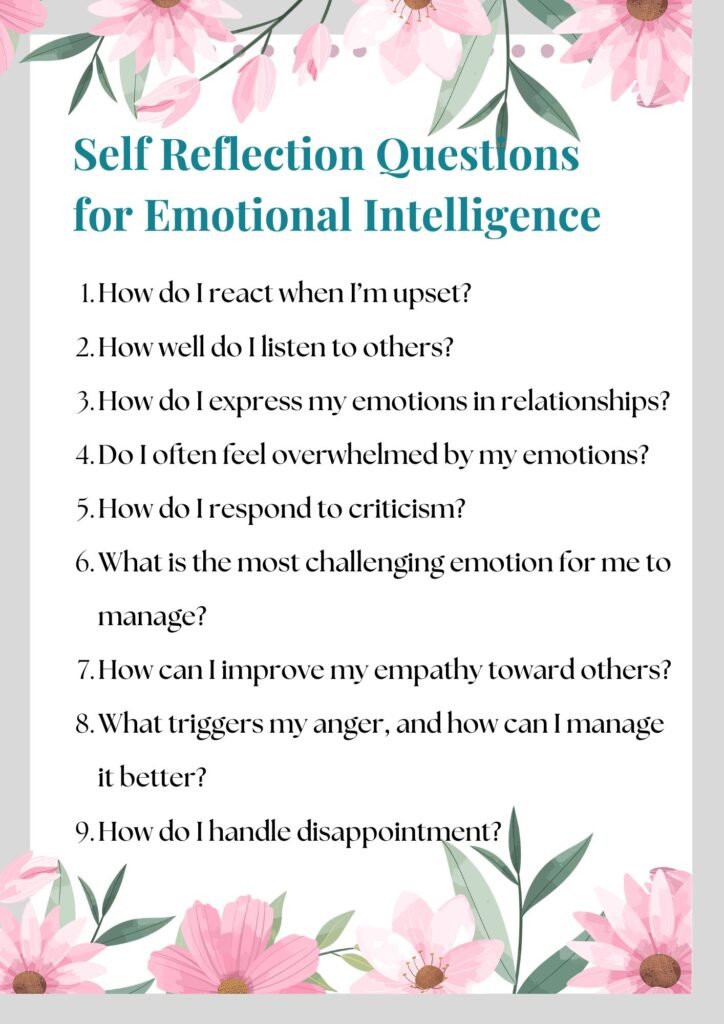
- How do I react when I’m upset?
- How well do I listen to others?
- How do I express my emotions in relationships?
- Do I often feel overwhelmed by my emotions?
- How do I respond to criticism?
- What is the most challenging emotion for me to manage?
- How can I improve my empathy toward others?
- What triggers my anger, and how can I manage it better?
- How do I handle disappointment?
- How can I better communicate my needs?
Self Reflection Questions for Relationships and Social Connections
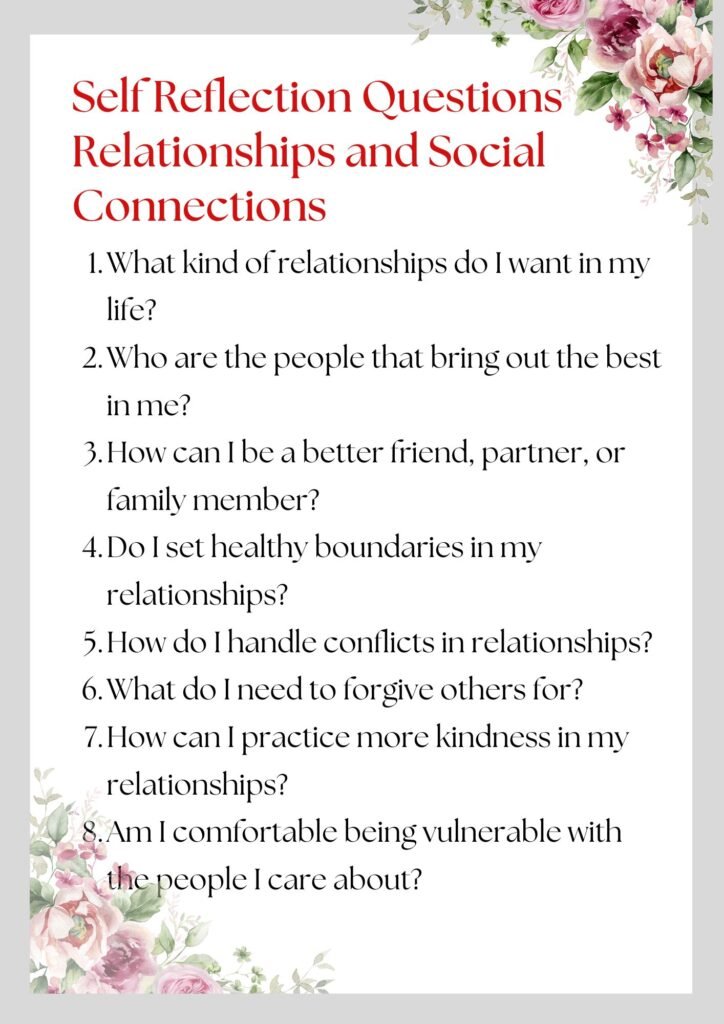
- What kind of relationships do I want in my life?
- Who are the people that bring out the best in me?
- How can I be a better friend, partner, or family member?
- Do I set healthy boundaries in my relationships?
- How do I handle conflicts in relationships?
- What do I need to forgive others for?
- How can I practice more kindness in my relationships?
- Am I comfortable being vulnerable with the people I care about?
- Do I surround myself with positive, supportive people?
- What are my relationship deal breakers?
Self Reflection Questions for Personal Growth and Learning
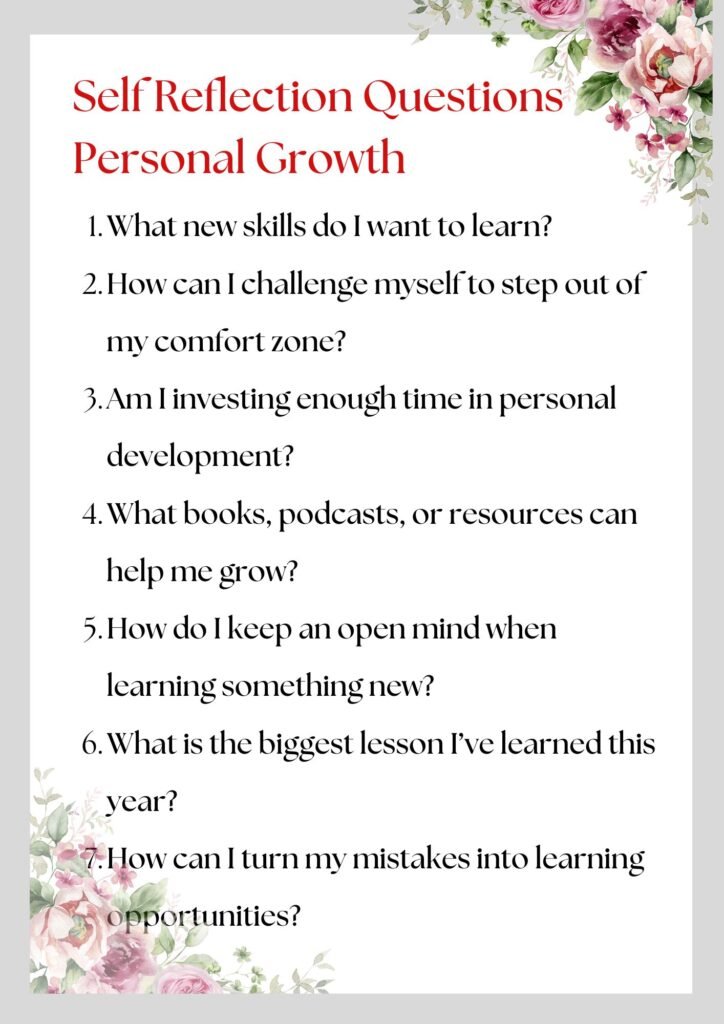
- What new skills do I want to learn?
- How can I challenge myself to step out of my comfort zone?
- Am I investing enough time in personal development?
- What books, podcasts, or resources can help me grow?
- How do I keep an open mind when learning something new?
- What is the biggest lesson I’ve learned this year?
- How can I turn my mistakes into learning opportunities?
- What am I curious about and want to explore further?
- How can I embrace change and growth in my life?
- What habits can I adopt to improve my personal development?
Self Reflection Questions for Career and Purpose
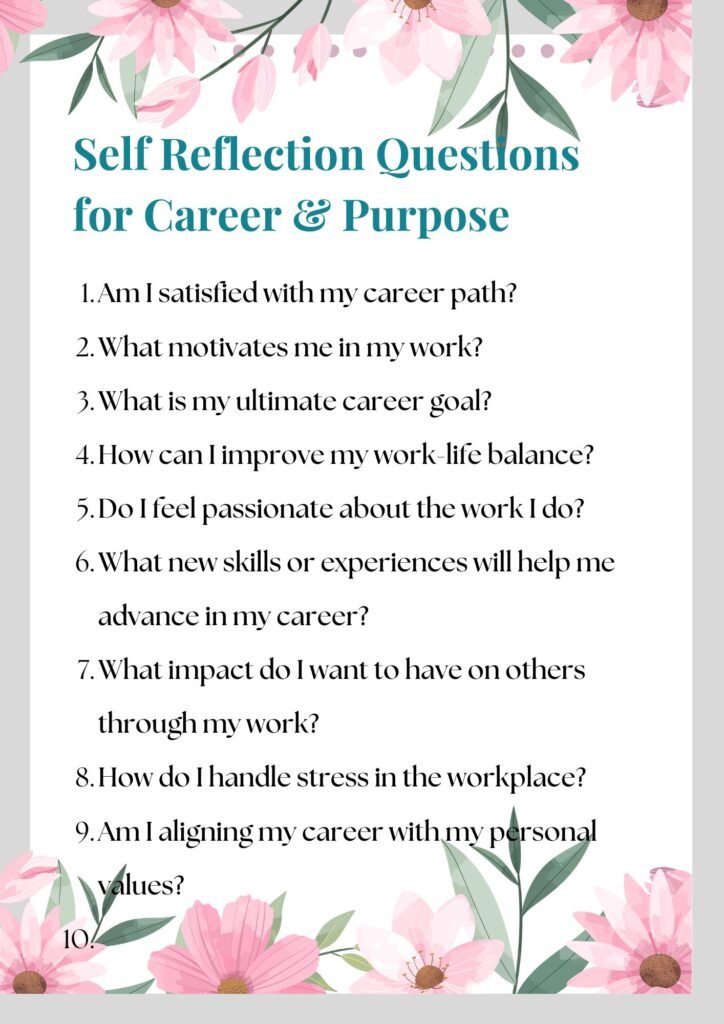
- Am I satisfied with my career path?
- What motivates me in my work?
- What is my ultimate career goal?
- How can I improve my work-life balance?
- Do I feel passionate about the work I do?
- What new skills or experiences will help me advance in my career?
- What impact do I want to have on others through my work?
- How do I handle stress in the workplace?
- Am I aligning my career with my personal values?
- What would I pursue if I wasn’t afraid of failure?
Self Reflection Questions for Creativity and Self-Expression
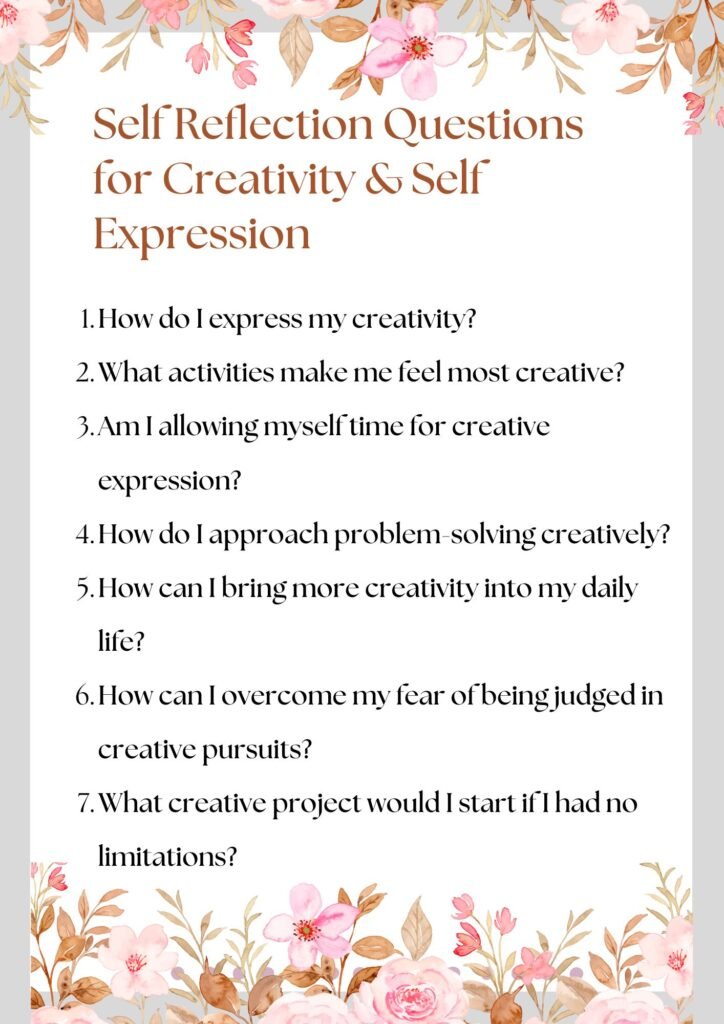
- How do I express my creativity?
- What activities make me feel most creative?
- Am I allowing myself time for creative expression?
- How do I approach problem-solving creatively?
- How can I bring more creativity into my daily life?
- How can I overcome my fear of being judged in creative pursuits?
- What creative project would I start if I had no limitations?
- What role does art, writing, or music play in my life?
- How can I use creativity to solve personal challenges?
- How can I make more space for self-expression in my life?
Self Reflection Questions for Mindset and Attitude
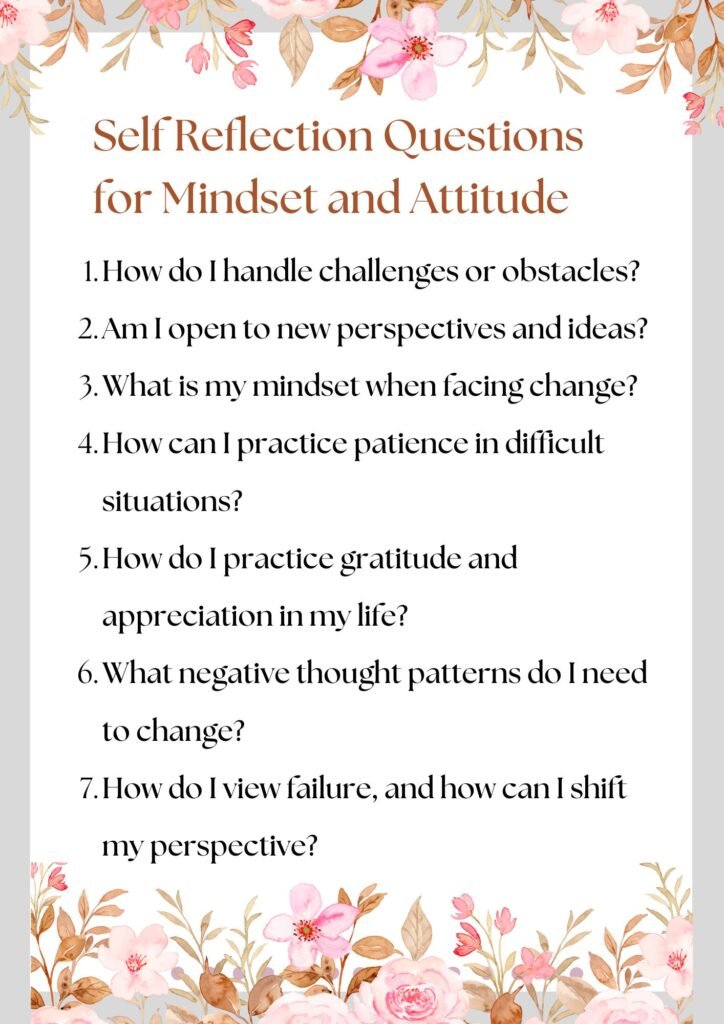
- How do I handle challenges or obstacles?
- Am I open to new perspectives and ideas?
- What is my mindset when facing change?
- How can I practice patience in difficult situations?
- How do I practice gratitude and appreciation in my life?
- What negative thought patterns do I need to change?
- How do I view failure, and how can I shift my perspective?
- Am I focusing on what I can control, rather than what I can’t?
- How can I maintain a growth mindset in everyday situations?
- How do I stay optimistic even when things don’t go as planned?
These questions can help you reflect on your personal growth journey and identify areas where you can focus for your personal growth and development.
Wrapping Up: The Importance of Self-Reflection
Taking time for self-reflection regularly is one of the best things you can do for personal growth.
Even just a few minutes each day or week can help you stay connected to your thoughts, feelings, and goals.
Asking yourself self-reflection questions can help you understand your life better and guide you to make better decisions.
Make Self-Reflection a Routine
Try to set aside a little time for self-reflection every day, like before bed or while journaling.
Regularly asking reflection questions like “What did I learn today?” or myself questions like “Am I happy with my choices?” can help you see patterns and figure out what needs to change.
The goal is consistency.
Be Patient with Yourself
It’s okay if answers don’t come right away.
Self-reflection takes time.
Be patient as you ask yourself introspective questions and give yourself space to think.
Over time, things will become clearer.
Please do not forget to click here and follow me on Pinterest !!
Use Your Insights to Make Positive Changes
The best part about self-reflection is that it helps you make positive changes.
Whether you’re setting new goals, changing a habit, or improving relationships, asking questions about self can help you figure out what’s most important and take steps toward a better life.
Self-reflection is a simple yet powerful way to grow and improve.
Keep asking deep questions to ask yourself to better understand your life.
Over time, this practice will help you gain clarity and confidence, guiding you toward personal growth and fulfillment.
Use these deep questions to ask yourself to explore your thoughts, and let your answers guide your future steps.
“Self-reflection is a humbling process. It’s essential to find out why you think, say, and do certain things… then better yourself.” – Sonya Teclai
FAQ: Self-Reflection for Women
1. What is self-reflection?
Self-reflection is the process of thinking about your thoughts, feelings, and actions to better understand yourself. It helps you learn from experiences, figure out what makes you happy, and discover areas where you want to grow.
2. Why is self-reflection important for women?
Women often face unique pressures and expectations from society. Self-reflection allows women to step back, focus on what they truly want, and understand their personal values, beliefs, and goals. It’s a tool for empowerment and growth.
3. How often should I practice self-reflection?
It’s best to make self-reflection a regular habit. Whether you take a few minutes each day or once a week, consistency is key.
The more often you reflect, the more you’ll understand your thoughts and feelings.
4. What if I can’t find answers right away?
That’s perfectly fine! Self-reflection is a process, and some answers may take time.
Be patient with yourself. The important thing is that you’re thinking about these questions and giving yourself time to reflect.
5. How can self-reflection help me improve my life?
Self-reflection helps you become more aware of your thoughts and actions.
Once you understand what’s working and what isn’t, you can make positive changes.
It can guide you in setting new goals, improving habits, and making better decisions in your personal and professional life.
6. What are some good self-reflection questions for women?
Some examples of self-reflection questions include:
- What are my core values?
- What do I truly enjoy doing?
- What goals am I working toward, and are they really mine?
- How can I take better care of myself emotionally and physically?
These questions can help you understand your priorities and make choices that align with who you are.
7. How do I start with self-reflection?
Start by setting aside a quiet time and place where you won’t be distracted.
You can write down your thoughts in a journal, or simply think about them.
Ask yourself questions like “How do I feel right now?” or “What do I want for my future?” The goal is to be honest and open with yourself.
8. Can self-reflection reduce stress?
Yes! When you take time to reflect, you gain clarity about your thoughts and emotions. This can help you identify sources of stress and figure out ways to handle them more effectively, making you feel more in control.

